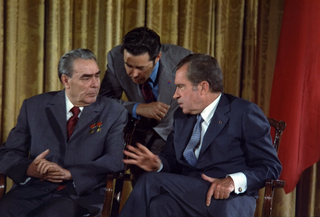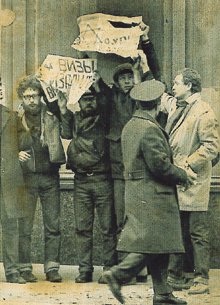Political freedom is a central concept in history and political thought and one of the most important features of democratic societies. Political freedom has been described as freedom from oppression or coercion, the absence of disabling conditions for an individual and the fulfillment of enabling conditions, or the absence of life conditions of compulsion, e.g. economic compulsion, in a society. Although political freedom is often interpreted negatively as the freedom from unreasonable external constraints on action, it can also refer to the positive exercise of rights, capacities and possibilities for action and the exercise of social or group rights. The concept can also include freedom from internal constraints on political action or speech. The concept of political freedom is closely connected with the concepts of civil liberties and human rights, which in democratic societies are usually afforded legal protection from the state.

Détente is the relaxation of strained relations, especially political ones, through verbal communication. The diplomacy term originates from around 1912, when France and Germany tried unsuccessfully to reduce tensions.

Human rights in Uzbekistan have been described as "abysmal" by Human Rights Watch, and the country has received heavy criticism from the UK and the US for alleged arbitrary arrests, religious persecution and torture employed by the government on a regional and national level. Amnesty International stated that freedom of expression, association, and peaceful assembly continue to be restricted, and that relations between gay men are illegal.

Helsinki Committees for Human Rights exist in many European countries as volunteer, non-profit organizations devoted to the protection of human rights. It was presumably named after the Helsinki Accords. It was formerly organized into the International Helsinki Federation for Human Rights (IHF), based in Vienna.
The British Helsinki Human Rights Group (BHHRG) was an Oxford-based non-governmental organization which claimed to monitor human rights in the 56 participating States of the Organization for Security and Co-operation in Europe (OSCE). Despite its name, the organisation was not affiliated to the Helsinki Committee for Human Rights. BHHRG was critical of what it characterized as Western interference in imposing democracy, and claimed to support the right of political independence from the west of a number of Communist and post-Communist regimes, as well as of a number of African dictators.

Refusenik was an unofficial term for individuals—typically, but not exclusively, Soviet Jews—who were denied permission to emigrate, primarily to Israel, by the authorities of the Soviet Union and other countries of the Soviet Bloc. The term refusenik is derived from the "refusal" handed down to a prospective emigrant from the Soviet authorities.

Turkmenistan's human rights record has been heavily criticized by various countries and scholars worldwide. Standards in education and health declined markedly during the rule of President Saparmurat Niyazov.
The International Helsinki Federation for Human Rights (IHF) was a self-governing group of non-governmental organizations that acted to protect human rights throughout Europe, North America and Central Asia. A specific primary goal was to monitor compliance with the human rights provisions of the Helsinki Final Act and its follow-up documents.

The 2001 About–Picard law [abu pika:r], officially Law No. 2001-504 of June 12, 2001, aimed at strengthening the prevention and repression of sectarian movements that undermine human rights and fundamental freedoms is French legislation passed by the National Assembly in 2000. The law is targeted at sects and movements deemed cultic that "undermine human rights and fundamental freedoms", as well as "mental manipulation". The law has caused controversy internationally, with some commentators alleging that it infringes on religious freedom while proponents contend that it reinforces religious freedom.
Union of Councils for Jews in the Former Soviet Union (UCSJ) is a non-governmental organization that reports on the human rights conditions in countries throughout Eastern Europe and Central Asia, exposing hate crimes and assisting communities in need. UCSJ uses grassroots-based monitoring and advocacy, as well as humanitarian aid, to protect the political and physical safety of Jewish people and other minorities in the region. UCSJ is based in Washington, D.C., and is linked to other organizations such as the Moscow Helsinki Group. It has offices in Russia and Ukraine and has a collegial relationship with human rights groups that were founded by the UCSJ in the countries of the former Soviet Union.
The MIVILUDES is a French government agency created by presidential decree in 2002. It is charged with observing and analyzing the phenomenon of cult movements, coordinating the government response, informing the public about the risks arising from sectarian aberrations, and facilitating the implementation of actions to aid the victims.
Soviet dissidents were people who disagreed with certain features of Soviet ideology or with its entirety and who were willing to speak out against them. The term dissident was used in the Soviet Union (USSR) in the period from the mid-1960s until the Fall of Communism. It was used to refer to small groups of marginalized intellectuals whose challenges, from modest to radical to the Soviet regime, met protection and encouragement from correspondents, and typically criminal prosecution or other forms of silencing by the authorities. Following the etymology of the term, a dissident is considered to "sit apart" from the regime. As dissenters began self-identifying as dissidents, the term came to refer to an individual whose non-conformism was perceived to be for the good of a society. The most influential subset of the dissidents is known as the Soviet human rights movement.

Human rights in Armenia tend to be better than those in most former Soviet republics and have drawn closer to acceptable standards, especially economically. In October 2023, Armenia ratified the Rome statute, whereby Armenia will become a full member of the International Criminal Court.

The Moscow Helsinki Group was one of Russia's leading human rights organisations. It was originally set up in 1976 to monitor Soviet compliance with the Helsinki Accords and to report to the West on Soviet human rights abuses. It had been forced out of existence in the early 1980s, but was revived in 1989 and continued to operate in Russia.
The Church of Scientology Moscow v Russia [2007] ECHR 258 is a European Court of Human Rights case, concerning Article 11 of the convention. In the case the European Court of Human Rights in Strasbourg condemned Moscow City Government's refusal to consider the Church of Scientology of Moscow for registration as a religious organisation, and as a result found that Russia had violated the rights of the Church of Scientology under Articles 11 when "read in the light of Article 9". Specifically, the Court determined that, in denying consideration of registration to the Church of Scientology of Moscow, the Moscow authorities "did not act in good faith and neglected their duty of neutrality and impartiality vis-à-vis the applicant's religious community". The Court also awarded the Church €10,000 in respect of non-pecuniary damage and €15,000 for costs and expenses.
Freedom of assembly in Russia is granted by Article 31 of the Constitution adopted in 1993, where it states that citizens of the Russian Federation shall have the right to gather peacefully, without weapons, and to hold meetings, rallies, demonstrations, marches and pickets. In practice, the right to freedom of assembly is restricted by Russian authorities. According to a Russian law introduced in 2014, a fine or detention of up to 15 days may be given for holding a demonstration without the permission of authorities and prison sentences of up to five years may be given for three breaches. Single-person pickets have resulted in fines and a three-year prison sentence.

Rasul Jafarov is a lawyer and prominent human rights defender in Azerbaijan.
In 1965 a human rights movement emerged in the USSR. Those actively involved did not share a single set of beliefs. Many wanted a variety of civil rights — freedom of expression, of religious belief, of national self-determination. To some it was crucial to provide a truthful record of what was happening in the country, not the heavily censored version provided in official media outlets. Others still were "reform Communists" who thought it possible to change the Soviet system for the better.

Antonio Stango is an Italian political scientist, an expert of human rights at international level, a writer and editor. After leading several non-governmental organizations, he is currently the President of the Italian Federation for Human Rights.









